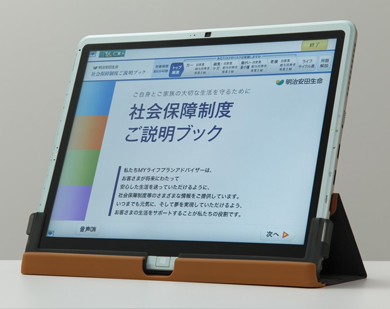News
Windows 8 Gets One of Its Largest Tablet Deployments in Japan
- By Jeffrey Schwartz
- August 07, 2013
A life insurance company in Japan is rolling out one of the largest known deployments of Windows 8-based tablets.
Meiji Yasuda Life Insurance Company is giving Fujitsu tablets running Windows 8 to 30,000 of its sales reps, both Fujitsu and Microsoft announced on Wednesday. The two companies say this is the largest rollout of Windows 8 tablets in Japan, and possibly ranks among the largest known deployments anywhere. Meiji Yasuda Life will start using the tablets next month at 1,200 locations, according to Fujitsu.
Both Fujitsu and Microsoft worked together to develop what they describe as a sales terminal. Equipped with a 12.1-inch display and just 15mm (.59-inch thick), it weighs approximately 880 grams (1.15 pounds) and is powered to last an entire day. In addition to sporting the typical Windows 8 touch interface, it's designed to allow for handwritten input, allowing customers to sign documents.
 The custom sales terminal. (Source: Fujitsu)
The custom sales terminal. (Source: Fujitsu)
The tablet has a built-in mobile WAN module to work on the wireless NTT DOCOMO LTE-based network. The systems are also designed to encrypt data on the tablets' solid state drives.
Erwin Visser, general manager of Windows Commercial Marketing at Microsoft, said in a blog post that the tablets are replacing Windows XP-based PCs, which the insurance sales reps used to put together proposals before printing them out.
"Using the Windows 8 tablets, their sales efforts will be more efficient and the customer experience will be greatly improved," Visser said. "The company also expects to process contracts more quickly, while ensuring customer security is protected and eliminating the need for printed documentation altogether."
This is a big win for Windows 8 and Microsoft, and probably welcome news after Monday's release of last quarter's tablet market share report from IDC.
Many IT pros are planning to pass on major Windows 8 rollouts because they typically skip releases after performing major upgrades. Most organizations have upgraded their Windows XP (and earlier) PCs with Windows 7, and don't see a need to transition again at this time. But there is still a significant number of Windows XP-based systems that will no longer be supported with security patches after Windows XP hits its end-of-life date on April 8, 2014. Microsoft is encouraging organizations to consider Windows 8 rather than Windows 7.
About the Author
Jeffrey Schwartz is editor of Redmond magazine and also covers cloud computing for Virtualization Review's Cloud Report. In addition, he writes the Channeling the Cloud column for Redmond Channel Partner. Follow him on Twitter @JeffreySchwartz.